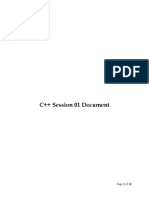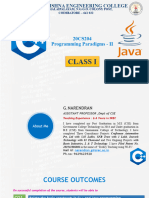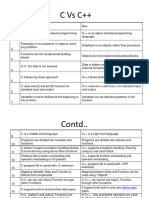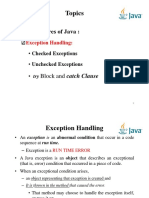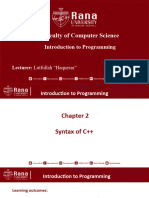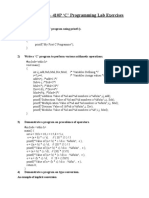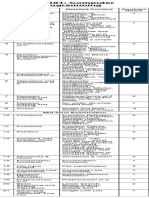C and C++ are both powerful and widely used programming languages, but they have significant
differences. C++ was originally designed as a "C with Classes" by Bjarne Stroustrup, intending
to extend C with object-oriented features. While C++ is often considered a superset of C, there
are some subtle incompatibilities, and the programming philosophies they promote are vastly
different.
Here is a detailed comparison of the key differences between C and C++:
1. Programming Paradigm
C (Procedural): C is a procedural or structured programming language. It focuses on a
top-down approach, where a program is broken down into a series of functions that
operate on data. The emphasis is on the "how" (the procedure) rather than the "what" (the
data). Data and functions are typically separate entities.
C++ (Object-Oriented & Multi-Paradigm): C++ is primarily an object-oriented
programming (OOP) language, but it's also a multi-paradigm language. It supports not
only procedural programming but also generic programming (via templates) and
functional programming. Its core focus is on the data, which is encapsulated within
objects that contain both data and the functions that operate on it. C++ follows a bottom-
up approach, building complex systems from smaller, well-defined objects.
2. Object-Oriented Programming (OOP) Features
This is the most significant difference. C++ was created to bring OOP concepts to C.
C: C does not support OOP features directly. There are no classes, objects, inheritance,
polymorphism, or encapsulation. You can simulate some of these features using structs
and function pointers, but it requires manual effort and is not type-safe.
C++: C++ fully supports the four pillars of OOP:
o Encapsulation: Using class and access modifiers (public, private,
protected) to bundle data and functions and hide internal implementation
details.
o Inheritance: Allowing a new class to derive properties and behaviors from a base
class.
o Polymorphism: Using virtual functions to allow a single interface to be used for
different types of objects.
o Abstraction: Providing a simplified interface to a complex system.
3. I/O Operations
C: C uses the standard I/O library (<stdio.h>) with functions like printf() for output
and scanf() for input. These functions rely on a format string to specify the type and
format of the data, which is not type-safe and can be a source of bugs if the format string
doesn't match the variable types.
C++: C++ uses the standard I/O streams (<iostream>) with objects cin for input and
cout for output. These use overloaded >> (extraction) and << (insertion) operators, which
� are type-safe. The compiler automatically selects the correct operator based on the data
type, preventing many common errors.
4. Memory Management
C: Dynamic memory management is handled by functions from the standard library
(<stdlib.h>), specifically malloc() for allocation and free() for deallocation. These
functions work on raw memory and do not call constructors or destructors. realloc() is
available for resizing memory blocks.
C++: C++ uses the new and delete operators for dynamic memory allocation and
deallocation.
o new automatically calls the object's constructor to initialize the memory.
o delete automatically calls the object's destructor to clean up resources before
freeing the memory. This helps prevent resource leaks and ensures proper object
lifecycle management. C++ also offers the delete[] operator for freeing arrays.
5. Error and Exception Handling
C: Error handling in C is typically done by checking return values from functions. For
example, malloc() returns NULL on failure, and functions often return an integer error
code. This requires the programmer to manually check the return value after every call,
which can be tedious and is often skipped.
C++: C++ provides a more robust and structured mechanism for exception handling
using try, catch, and throw blocks. When an error occurs, an exception can be thrown,
and a specific catch block can handle it, allowing for a cleaner separation of error-
handling logic from the main program flow.
6. Data Types
C: C supports built-in data types (e.g., int, char, float) and allows for user-defined
types using struct, union, and enum. However, these are simple data structures without
any associated functions.
C++: C++ not only supports all C data types but also adds class, which is the
fundamental building block of OOP. A class is essentially a struct with the added
capability to include member functions, constructors, destructors, and access modifiers.
C++ also has a richer standard library with user-friendly types like std::string.
7. Other Key Features
Namespaces: C does not have namespaces. This means that all functions and global
variables are in a single global scope, which can lead to name collisions in large projects
or when using multiple third-party libraries. C++ uses namespace to organize code and
prevent name conflicts.
Reference Variables: C does not support reference variables. C++ supports reference
variables, which are aliases for existing variables and are often used to pass arguments to
functions by reference without the need for pointers.
� Function Overloading: C does not support function overloading. You cannot have two
functions with the same name. C++ allows function overloading, where multiple
functions with the same name can exist as long as their parameter lists are different (e.g.,
int add(int a, int b) and float add(float a, float b)).
Default Arguments: C does not support default arguments for functions. C++ allows
you to specify default values for function parameters, which makes a function more
flexible to call.
Inline Functions: C++ supports inline functions, which can improve performance by
telling the compiler to substitute the function call with the function body to reduce
function call overhead.
Templates: C++ has templates, a powerful feature for generic programming. Templates
allow you to write functions and classes that work with any data type, without having to
rewrite the code for each type. C does not have an equivalent feature.
Keywords: C++ has a larger set of keywords than C (e.g., class, new, delete, try,
catch, public, private, template, virtual).
Summary Table
Feature C C++
Programming Object-oriented, multi-paradigm, data-
Procedural, function-driven
Paradigm driven
Main Focus Process and procedure Data and objects
Fully supports encapsulation,
OOP Features No native support
inheritance, polymorphism, abstraction
printf() and scanf() (not type-
I/O cout and cin (type-safe)
safe)
Memory malloc() and free() (manual, no new and delete (calls
Management constructors/destructors) constructors/destructors)
Error Handling Manual checking of return values try-catch exception handling
All of C's, plus class and robust
Data Types Built-in types, struct, union standard library types (std::string,
etc.)
Keywords ~32 (C90) ~63+
Namespaces No Yes
References No Yes
Function
No Yes
Overloading
Templates No Yes
C code is mostly compatible with C++ code is generally not compatible
Compatibility
C++ with a C compiler

